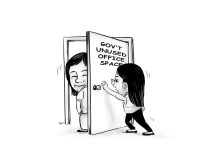
AHEAD of the May 2025 midterm elections, the Department of Social Welfare and Development (DSWD) in Western Visayas has vehemently refuted claims that politicians wield the power to delist beneficiaries from the Pantawid Pamilyang Pilipino Program (4Ps), a conditional cash transfer scheme designed to ameliorate poverty by nurturing human capital.
Indeed, social welfare programs such as the 4Ps must remain insulated from political interference to preserve their integrity and purpose. The misuse of these programs for political leverage undermines the democratic process and the very goal these initiatives aim to achieve — lifting families out of poverty. When politicians imply that support for their candidacy can influence a beneficiary’s standing in a program like the 4Ps, they not only erode trust in these vital systems but also subvert the democratic rights of the citizens they serve.
DSWD’s assurances that the 4Ps program is immune to such political meddling is a strong step forward, but this matter calls for more than just verbal guarantees. The real safeguarding lies in establishing robust, transparent mechanisms that ensure their operation free from political influence. This includes detailed public disclosure of the criteria for beneficiary selection and delisting, and strict oversight mechanisms that hold officials accountable for manipulations.
Educating beneficiaries about their rights is equally important. It empowers them to resist coercive political tactics and reinforces the principle that access to government support should not be conditional on political allegiance. This education should also extend to a broader public awareness campaign to inform the general populace about the non-partisan nature of welfare benefits, which are rights rather than favors.
Legislation could further fortify protections for welfare programs. Laws that specifically prohibit the use of social welfare benefits as electoral tools could deter potential abuses by attaching serious legal consequences to such actions. Such legal frameworks would not only protect beneficiaries but also enhance the political culture by promoting clean elections.
Protecting welfare programs like the 4Ps from political manipulation is essential not only for the health of our democratic processes but also for the efficacy of the programs themselves. They are designed to break the cycle of poverty through education and health support, not to entrench a cycle of political dependency.
As the elections approach, let this be a reminder to all stakeholders — politicians, beneficiaries, and the general public — of the sanctity and independence that must govern our social welfare programs.







